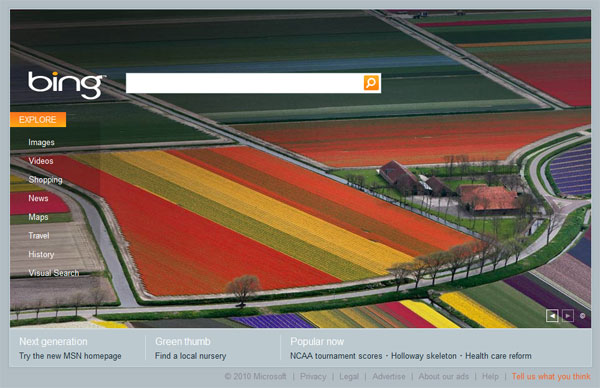Bing's Market Share Hits All-Time High
For a while now, Microsoft has been
attempting to attract users with its Bing search engine and gain a larger
portion of the market share. A new statistic from Nielsen seems to show that
Microsoft may be headed in the right direction.
According to Nielsen, Bing's market share reached an all-time high in February with 12.5% of the market. What's most notable about this number is the fact that it represents a 15% increase from Bing's market share in January. Microsoft has enjoyed consistent growth since April 2009 when it had a market share of 9.9%, but the jump from 10.9% in January to 12.5% in February is the biggest leap we've seen yet.
The increase coincides with the announcement last month that Yahoo! and Microsoft were given regulatory approval for their search alliance. However, considering Yahoo's market share has declined since last year, the combination of Yahoo and Bing may not make a big difference for market-share leader Google who has enjoyed a 64%-67% market share over the past year. In February, Google had a market share of 65.2%. By comparison, Yahoo had a market share of 14.1% the same month. Even as a united front, Microsoft and Yahoo aren't likely to present a huge threat to Google.

Even so, SEO companies will likely pay attention to Microsoft and Yahoo, who combined will have approximately 25% of the market. In addition, it's likely that Bing's market share will continue to grow. Danny Shepherd, President of Titan SEO, agrees: "We expect to see Bing's market share continue to grow, but it is very unlikely it will maintain the same rate of growth every month. People are interested in checking out Bing and new Search Alliance, but most people who 'Google' will continue to search that way."
Furthermore, Bing has a few areas where it tends to outperform Google's search algorithm, specifically in providing real-time updates to airfare schedules, ticket prices, shopping items, reference materials, health updates, and more. People are also starting to pay more attention to Bing Maps, a competing service to Google Maps.
According to Nielsen, Bing's market share reached an all-time high in February with 12.5% of the market. What's most notable about this number is the fact that it represents a 15% increase from Bing's market share in January. Microsoft has enjoyed consistent growth since April 2009 when it had a market share of 9.9%, but the jump from 10.9% in January to 12.5% in February is the biggest leap we've seen yet.
The increase coincides with the announcement last month that Yahoo! and Microsoft were given regulatory approval for their search alliance. However, considering Yahoo's market share has declined since last year, the combination of Yahoo and Bing may not make a big difference for market-share leader Google who has enjoyed a 64%-67% market share over the past year. In February, Google had a market share of 65.2%. By comparison, Yahoo had a market share of 14.1% the same month. Even as a united front, Microsoft and Yahoo aren't likely to present a huge threat to Google.

Even so, SEO companies will likely pay attention to Microsoft and Yahoo, who combined will have approximately 25% of the market. In addition, it's likely that Bing's market share will continue to grow. Danny Shepherd, President of Titan SEO, agrees: "We expect to see Bing's market share continue to grow, but it is very unlikely it will maintain the same rate of growth every month. People are interested in checking out Bing and new Search Alliance, but most people who 'Google' will continue to search that way."
Furthermore, Bing has a few areas where it tends to outperform Google's search algorithm, specifically in providing real-time updates to airfare schedules, ticket prices, shopping items, reference materials, health updates, and more. People are also starting to pay more attention to Bing Maps, a competing service to Google Maps.

